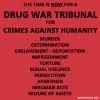01/19/22 Dr. Khalid Tinasti
Dr. Khalid Tinasti, Executive Director of the Global Commission on Drug Policy joins DTN host Dean Becker for a second half hour to disect the logic of the drug war. Dr, Tinast also is featured in DTN's 90 minute video production: Claiming the Moral High Ground.





